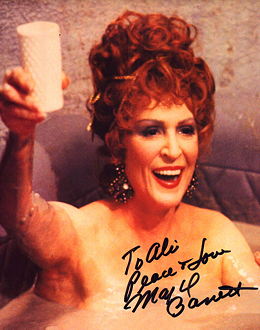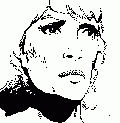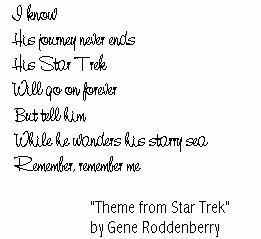

|
Gene Roddenberry gave the world a universe. It was not his alone, a television, film, and literary
production becomes the collaborative effort of all the people who worked on it, and who continue to
add their mark. We might decry (as Gene Roddenberry sometimes did) the slants that some put on his
work. We might wish that his strong desire to keep the CHARACTERS that he created intact was
respected. Too often his efforts to stop the many who wrote strange out-of-character out-of-context
fannish sex fantasies (K&S stories) were ignored.
Since Roddenberry's death there have been two new series, Deep Space Nine and Voyager , more movies and Star Trek novels in
bookshops. We have reaching a time when we are able to separate the man from his vision. At least
enough to say something important in the universe he helped to build. In the Nineteen Nineties this
planet IS the Star Trek universe.
Gene Roddenberry envisioned societies where the males were oppressed, where differences in colours and shapes suffered prejudices, and ships where the individual was free to reach his or HER (or its) best potential. However, he was a man of the middle twentieth century and he sometimes could not rise above that, writing down his female characters, such as when he introduced Worf to sidestep Tasha Yar's command of the saucer section in Encounter at Farpoint. We welcome the new female captain, and the producers and writers who could envisage her. |

|
The "Mother from Hell" is born |
 Majel Barrett in Star Trek: The Next Generation |
| The woman who lived beside him in the last decades of his life, Majel Barrett, continues to work in his
universe, travelling to conventions, selling merchandise and acting in his universe. She is the official
voice of the Starfleet computers, and plays Lwaxanna Troi, the mother from hell who drives her
daughter to chocolate.
Majel Barrett tells the story of how Gene Roddenberry came home one day and declared, "I have the perfect role for you -- you don't even have to act." and, Majel says, "The mother from hell was born." As Lwaxanna Troi, Majel Barrett and the Star Trek writers have explored the issues of ageing and loneliness in our own increasingly ageing society. Visiting Melbourne in 1994, Majel said, "That's the big thing in Los Angeles, if anybody ever recognises me its usually a woman over forty. One of them yelled across a market, another one came over to me in a parking lot and said to me, "You have done more for women in America over forty, ... everyone thinks that they are dead, they are dormant and that they don't live ... and it's a great image. And you know who else goes for the character? " she continued, "Young men. They see something about the character in her that they like, although she is the mother from hell. But there is something that is tolerable about her. Sure if they had her for a mother they would go crazy, but they wouldn't mind it as much." |
|||
| Dividing her time between being an actress and a merchandiser, she says that she doesn't consider
herself either. In a lifetime of Star Trek, the last few years have brought her new challenges.
"The last four shows that I've done on Star Trek have been absolutely remarkable experience for me. Each one was totally different, and each one had its own loveliness and each one was much more powerful than the other. And I would never, outside of the situation that I'm in, be given the opportunity to do the kind of roles that I have gotten to do, and make the kind of growth that I've been able to make in these last four years with that character." Majel Barrett and D. C. (Dorothy) Fontana continue working in Gene Roddenberry's universe with Ranger, a character that he created for a series that was never made. "Gene thought up a bunch of characters for a television show... Ranger is the character ... The character has been shifted around an awful lot since he put it together. Everything is within Gene Roddenberry's universe ... within Star Trek's universe, like Questor was, like Planet Earth. We will work with problems of the nineties, ... it doesn't have to have technology." "I've been exposed to so many parts, and so many things. Ordinarily I wouldn't have access to the things that I have had, obviously working around Gene for thirty years now, working in and at Star Trek has exposed me to all sorts of things that I would never have been exposed to. I think that's been the most valuable thing. And then living with a man whose imagination was as fertile as Gene's. And ... listening in fascination to his stories. He was the greatest storyteller in the world. I don't mean lying, although he was adept at that too. But he always told you what you wanted to hear." "I got a lot listening in on that. But the man did always have a story, he wanted to tell a story, that's why the shows that we originally did and these shows all do the same thing. We're not heavy (on) technology at all. We must be correct on technology, but never ... dependent on it.
"(Dorothy Fontana) and I were in at the beginning of this phenomenon called Star Trek. If anybody in the world can write Gene Roddenberry she can." Ms Barrett hopes that women writing the characters, will create stronger female characters, although she reminds us that the Lwaxanna Troi was created by a man." Majel Barrett and Dorothy Fontana collaborated on the Ranger comics from Big Entertainment. These comics, hand drawn and computer-coloured will be available in print, on interactive CD-ROMs and comic videos. Fans will be able to communicate with the developers, see extracts from upcoming issues of the range (which includes Leonard Nimoy's Primortals and Neil Gaiman's Mr Hero), and read their letters to the editors on the CD-ROMs. But she does not see the new interactive media in competition with the traditional printed books and comics. "Certainly it will be very predominant in the next ten years." she says, I think (people) will read, because books are the most valuable thing in this whole wide world. Even if you put them on a computer you still have to read them, so it doesn't matter what form they take. If they can make good pictures on computers, fine, but I don't think they're a substitute." January 2001 will be the birth of a new century, and Star Trek will be there. In print, on disk, on the airwaves, and in our hearts and minds. Some of the bravest, brightest moments and insights of Star Trek were not those of the "Great Bird of the Galaxy", but the people who took his finest creations and gave us laughter and tears, and something to think about. Beyond everything else, let's take with us into the future the best of his vision, a plea for joining together, enjoying and respecting our differences, and developing ourselves instead of attacking others. Those of us who live in Star Trek's universe have seen the future, and it is hope. |
|
||
| Written by Ali Kayn Reprinted by permission from The Science Fiction, Fantasy and Horror Fan Resource Book (1995) Illustration by Betty Franklin More Trek? see our interview with Robert O'Reilly (Gowron); and with writer David Gerrold External Links: www.roddenberry.com Memory Alpha Wiki Wikipedia entry Majel Barrett on IMDb Just the Facts: Born: Majel Lee Hudec in Cleveland, Ohio on 23-Feb-1932 Died: 18-Dec-2008 Los Angeles, California |
|
Like us on facebook |
No other uses are permitted without the prior written consent of owner. Use of the material in violation of the foregoing may result in civil and/or criminal penalties. Celebrate everything! www.festivale.info ISSN 1328-8008 Published in Melbourne, Victoria, Australia disclaimers | contact the editor | Festivale revision history  Published in Melbourne, Victoria, Australia Published in Melbourne, Victoria, Australia  copyright © Festivale 1999 All rights reserved copyright © Festivale 1999 All rights reservedFiled: 24-Nov-1997 Entire site refreshed: Dec 2008-Feb 2009 | Site URL transferred: Jan 2005 (previously www.festivale.webcentral.com.au) |



